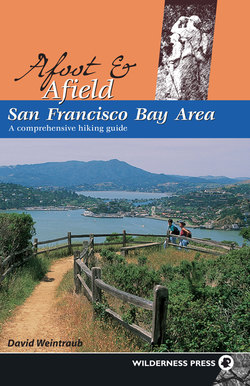Читать книгу Afoot and Afield: San Francisco Bay Area - David Weintraub - Страница 15
На сайте Литреса книга снята с продажи.
ОглавлениеTRIP 1 Golden Gate Park: Native Oak Grove
| Distance | 1.5 miles, Loop | |
| Hiking Time | 1 hour or less | |
| Difficulty | Easy | |
| Trail Use | Leashed dogs, Good for kids | |
| Best Times | All year | |
| Agency | SFR&PD | |
| Recommended Map | Map & Guide to Golden Gate Park (Friends of Recreation and Parks) |
HIGHLIGHTS Tucked in the northeast corner of the park, this loop wanders through secluded groves of coast live oaks, but also joins joggers, skaters, and strollers beside busy John F. Kennedy Dr., as they zoom past the photogenic Conservatory of Flowers, reopened not long ago after years of repairs. It is hoped this brief introduction to Golden Gate Park will entice you to explore on your own, because there is much to see and do here.
DIRECTIONS Parking around Golden Gate Park is often hard to find, especially on weekends. Also, there are road closures within the park on weekends and most holidays. If possible, use public transportation. San Francisco Muni bus lines 5, 21, and 33 serve the trailhead at Fulton and Arguello streets. For more information, call SF Muni: (415) 673-6864.
FACILITIES/TRAILHEAD Restrooms, phones, and snack/food vendors are scattered throughout the park. There are no facilities at the trailhead, which is at Clark Gate, on the southeast corner of Arguello Blvd. and Fulton St.
Conservatory of Flowers is one of the park’s best-loved and most-photographed buildings.
From the trailhead, you go through a gap in the stone wall, just left of the two pillars flanking the Arguello entrance to the park. Steps help you negotiate a steep uphill pitch that leads southeast, into a forest of ivy-draped coast live oaks. Passing a rest bench, you follow a single-track trail to a fork, where you bear left (the right-hand branch soon rejoins). Joining the native oaks in this part of the park are planted species such as eucalyptus, cypress, Monterey pine, acacia, and olive.
At the next fork, bear left and descend to a paved path, which you cross. The trail continues on the far side of the paved path, climbs moderately and then descends. At the next paved path, you turn left. After about 150 feet, just before you reach the corner of Fulton and Stanyan streets, turn right on a paved path that changes to dirt just beyond a rest bench.
Climbing gently on a single track, you soon merge with a wide dirt path by veering slightly left. Pass through a large clearing and then follow the path as it curves right and descends. At a T-junction, turn left on a wide dirt path, and then come to a paved path, where there is a water fountain. To your right is Conservatory Dr. East, a paved road.
Bear left on the paved path, then angle right at a fork. Rhododendrons line the path, ecologically at home beneath a large coast redwood. About 100 feet ahead, a paved path merges on your left. You continue straight, skirting a parking area, left, and then veer right to pass around McLaren Lodge.
Passing a couple of rest benches, right, your path bends left and meets a paved path that parallels Kennedy Dr. Here you turn right and soon cross Conservatory Dr. East. The paved path continues on the other side of Conservatory Dr., and you follow it past two well-known park attractions — the tennis courts, left, and the dahlia garden, right. The park’s oldest building, the Conservatory of Flowers, is ahead and right.
McLaren Lodge
This picturesque stone building, which houses the San Francisco Recreation and Park Department headquarters, was built in 1896 and is named for the park’s second, and most influential, manager, John McLaren.
The Conservatory was damaged in 1995 by a windstorm and was closed many years for repairs; it reopened in September 2003. It houses an extensive collection of tropical plants, including palms, orchids, bromeliads, and carnivorous species.
Just past the Conservatory, you cross Conservatory Dr. West, then resume your ramble along the north side of Kennedy Dr. To your right is the George Washington elm, planted here in 1952 by the San Francisco Chapter, Sons of the American Revolution. According to a plaque here, the parent of this tree spread its limbs over George Washington as he took command of the American Army on July 3, 1775.
Once common shade trees east of the Rockies, elms in the United States have been decimated by Dutch elm disease. This fungal disease, spread by beetles, was introduced by accident around 1930. It’s good to see a healthy elm flourishing, especially one with so distinguished a past.
At about 1 mile, you come to a paved path on the right, the first since you crossed Conservatory Dr. West. Turning right, you climb moderately past several rest benches and dirt paths, all on your left. When you reach a chess-themed area — pedestals in the shape of knights and rooks supporting a covering that provides shade for tables and benches — bear left and follow a paved path through it.
With the chess area on your left, you merge with a paved path that joins from the right. Go about 75 feet to a junction, where you turn right onto a dirt path and stay left where it forks. Now you descend gently through a beautiful grove of coast live oak, traversing a hillside that drops left. At the next fork stay left again, and follow the path to a park entrance on Fulton St. across from 2nd Ave. Turn right and follow the sidewalk back to the trailhead.
